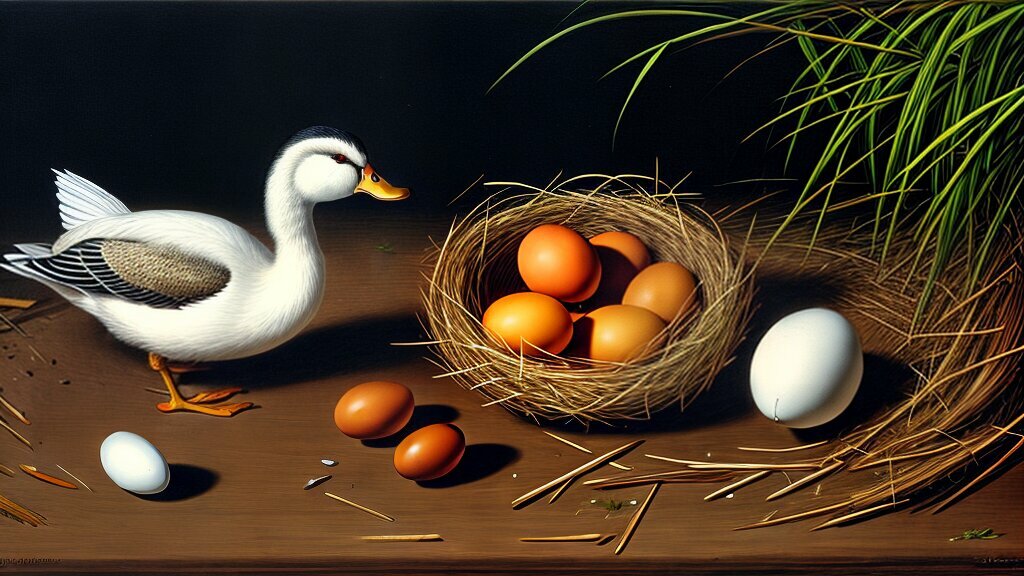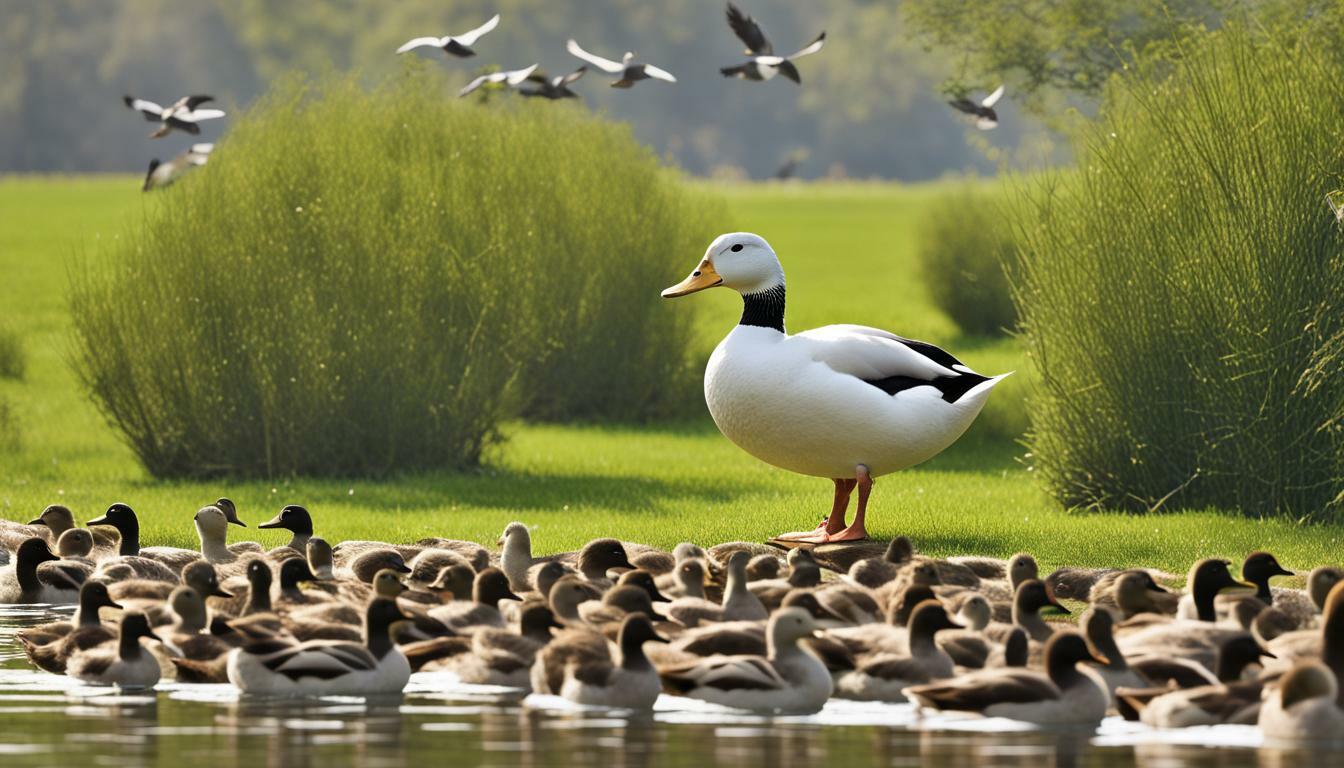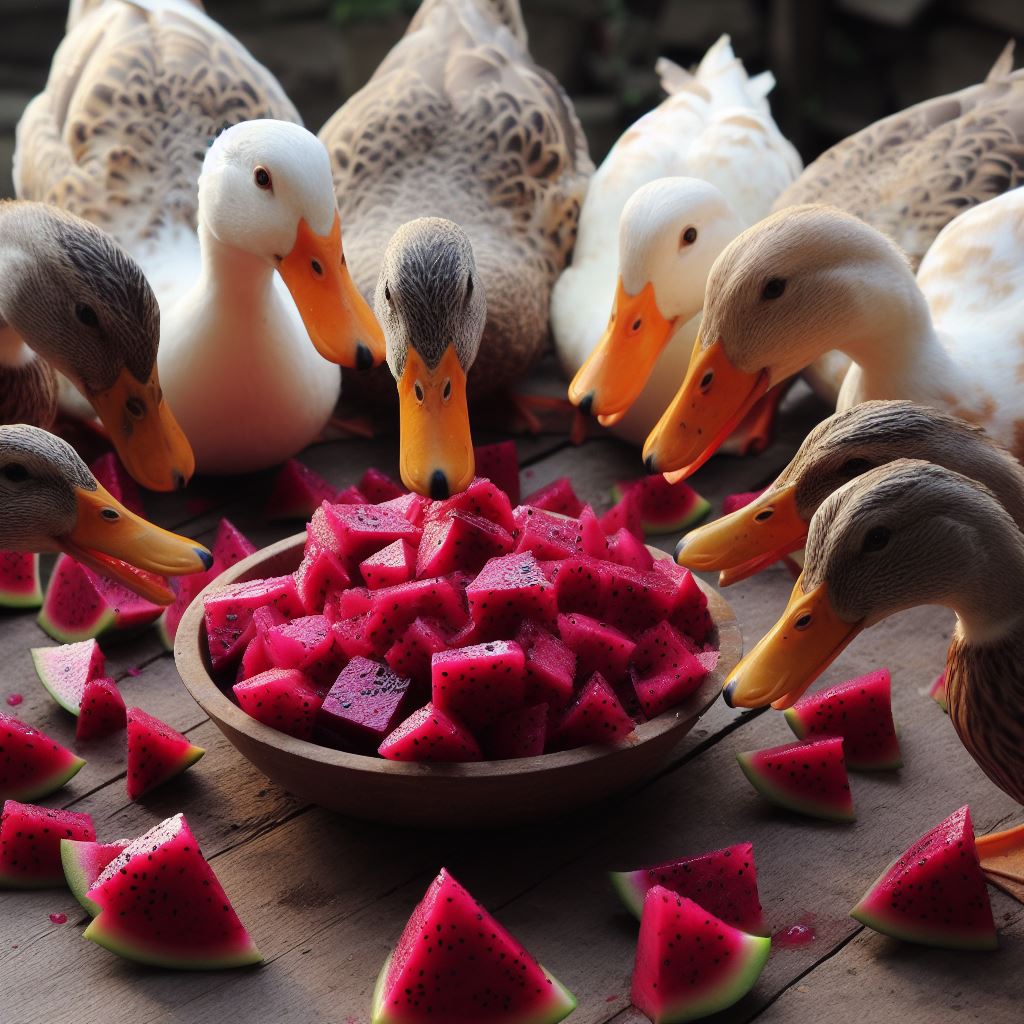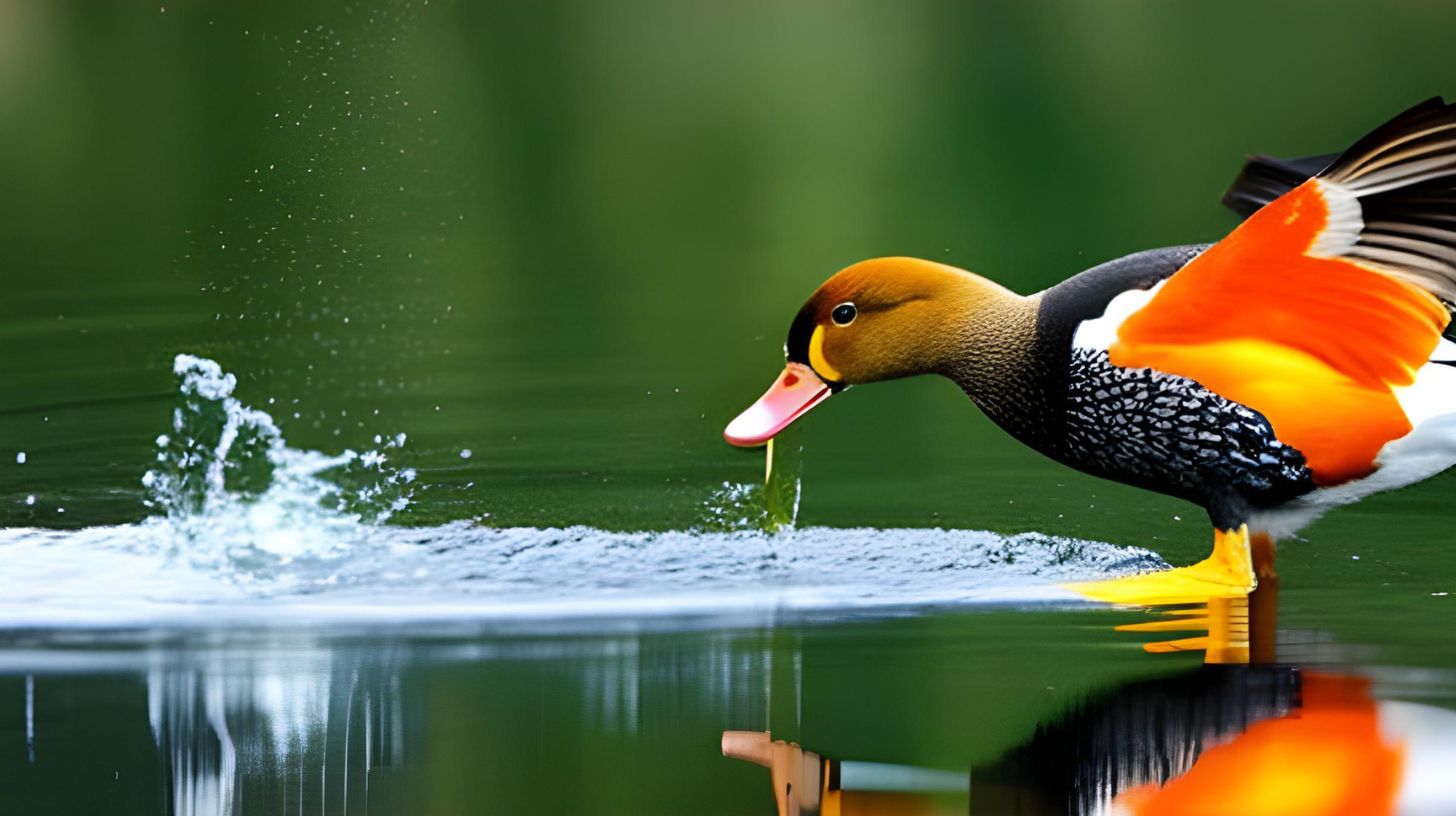Do Ducks Really Eat Their Own Eggs?

Daftar isi:
- Why Don’t Ducks Typically Eat Their Own Eggs?
- When Might a Duck Eat Its Own Eggs?
- Why Do Ducks Eat Their Own Eggs?
- Do Mother Ducks Eat Their Own Eggs?
- Do Pekin Ducks Eat Their Own Eggs?
- Why are Eggs So Important to Ducks?
- Fascinating Duck Egg Facts
- Duck Maternal Behaviors and Instincts
- The Maternal Duck’s Quack Sounds Different!
- Conclusion
Ducks are unique creatures with interesting behaviors when it comes to their eggs. You may be wondering, do ducks eat their own eggs? The short answer is no, ducks generally do not eat their viable, fertilized eggs that they lay. However, there are some exceptions to this rule. Read on to learn all about ducks and their egg eating habits!
Why Don’t Ducks Typically Eat Their Own Eggs?
Ducks have strong natural instincts to incubate and hatch their eggs, not eat them. After mating, female ducks look for safe nesting sites with plenty of hiding spots and coverage. Once a nest is built, the duck lays a clutch of around 5-15 eggs over several days.
When all the eggs are laid, the duck enters full broody mode. Also called going “clucky”, broody ducks diligently incubate their eggs until they hatch, only leaving the nest for quick breaks to eat, drink and preen. Ducks maintain the eggs at proper warmth and humidity levels. They may even pluck their own chest feathers to transfer warmth to the eggs!
As you can see, ducks have an innate drive to nurture and hatch their eggs. Eating their own eggs would go against these natural behaviors. Ducks form attachments to their nest and get very defensive against any predators that may threaten their developing ducklings inside the eggs.
Mother ducks vigilantly stand guard over the nest or cover it with debris when they take a break. Some ducks may even lead perceived predators away from the nest area with distraction displays. Their dedication to seeing the eggs hatch is truly remarkable!
When Might a Duck Eat Its Own Eggs?
While ducks generally won’t purposefully eat their viable eggs, there are some exceptions. If an egg happens to get cracked or damaged in the nest, a duck may eat it to prevent predators from being attracted to the scent.
They may also eat an egg that has gone bad or is non-viable for other reasons. Ducks have a surprisingly refined sense of smell that lets them determine if an egg has rotted. Rotten eggs could explode, attract predators, or make the other eggs sick, so ducks eliminate them.
Another time a duck might snack on her own eggs is if she laid more than she can properly incubate. Ducks can lay very large clutches, sometimes too large for the nest or their body heat to cover. If incubating all the eggs proves impossible, they may eat excess eggs.
Finally, ducks might eat their own unfertilized eggs. Even without a drake to fertilize the eggs, hens continue laying clutches. These eggs won’t hatch ducklings, so the duck is free to eat them. Doing so allows the duck to regain lost protein and calcium from the egg she laid.
Why Do Ducks Eat Their Own Eggs?
To quickly recap, ducks do not typically eat viable, fertilized eggs that they lay themselves. Their hormones and instincts drive them to nurture and hatch their own eggs, not see them as food.
However, a duck may eat her own eggs under certain circumstances like damage, rotting, overabundance, or lack of fertilization. If predated by another animal, they will abandon the eggs as a lost cause. But ducks won’t readily abandon or eat eggs that have potential to hatch for no reason.
Do Mother Ducks Eat Their Own Eggs?
What about mother ducks specifically? Do mama ducks ever snack on their eggs? Again, the answer is generally no. Mother ducks have extremely strong urges to nurture their offspring from egg to adulthood.
After mating and laying, mother ducks enter full broodiness mode. They diligently keep the eggs heated and protected in their nest, only leaving for quick breaks. Mother ducks may even pluck their own feathers to line the nest with soft down. If predators approach, they will puff up and spread their wings to appear larger and more threatening.
Mothers form attachments to their nest and will defend it fiercely. They will vigilantly stand guard over their nests when taking short breaks or try to lead predators away with distraction displays. Once the adorable ducklings hatch, she protects and guides them on their journey to water. To a mother duck, her eggs represent her future offspring, not food.
Of course there are exceptions, as covered earlier. She may be forced to abandon her nest or eat non-viable eggs under certain circumstances. But a mother duck’s default instinct is to nurture her fertilized eggs until they hatch, not consume them for food. Her maternal drive overrides any nutritional incentive she may have to eat her own eggs.
Do Pekin Ducks Eat Their Own Eggs?
Pekin ducks are a popular domestic duck breed known for their tasty meat and large white eggs. You may be wondering, do Pekin ducks eat their own eggs like wild ducks sometimes do?
The answer is no, Pekins do not normally eat their fertilized, viable eggs. As domesticated ducks, their natural instincts to incubate and hatch eggs are still very strong. A Pekin duck will cover a nest of eggs until they hatch just like any other duck.
Of course, there are caveats if the eggs are non-viable, damaged, or abandoned. And since Pekins may lay a very large number of eggs, they may eat excess eggs that they cannot properly incubate. Unfertilized Pekin eggs may also get eaten by the ducks that laid them.
But in general, a Pekin duck will not intentionally consume eggs she laid herself that have the potential to hatch ducklings. Her hormonal drive to nurture offspring overrides any inclination to eat the nutritious eggs. So while Pekin ducks lay more eggs than wild ducks, their maternal behaviors are still the same.
Why are Eggs So Important to Ducks?
Ducks have evolved some fascinating behaviors and adaptations when it comes to their eggs. But why are eggs so precious to ducks in the first place? What’s the big deal if a duck snacks on some of her own eggs?
For starters, eggs contain all the nutrition needed to grow healthy baby ducks. Duck eggs are packed with protein, healthy fats, and important vitamins and minerals. As the sole food source for developing ducklings, eggs are a precious commodity.
The nutritious yolk provides essential fat and protein to help ducklings grow. The whites are also high in protein for muscle development. The calcium-rich shell provides bone strength and beak hardness. Ducks can even reabsorb leftover calcium from their shells when hatching.
Eggs also represent the future genetic lineage of the ducks. Continuing the bloodline is essential motivation for ducks to diligently incubate their eggs. Ducks only live around 10 years, so offspring are necessary for long term species survival.
Finally, laying and brooding over eggs triggers a complex set of hormonal responses in female ducks. Their natural instincts to lay, incubate, and care for eggs are imprinted in their biology, which overrides any impulse to eat their eggs. Simply put, ducks are hard-wired to nurture their own eggs, not consume them.
Fascinating Duck Egg Facts
Duck eggs share some fascinating similarities and differences from common chicken eggs:
- Size – Duck eggs are generally larger than chicken eggs. A typical duck egg weighs around 70 grams compared to a chicken egg at 60 grams.
- Color – Duck egg shells are often green or blue tinted rather than white or brown. The color comes from pigments in the duck’s food that get deposited in the shell.
- Yolk – Duck egg yolks tend to be larger and richer than chicken yolks. The higher fat content makes them great for cooking and baking.
- Taste – Duck eggs taste similar to chicken eggs but often have more savory, umami flavor. The flavors can vary based on the duck’s diet.
- Nutrition – Duck eggs have more overall fat, calories, and cholesterol than chicken eggs. But they have lots of beneficial nutrients like choline, folate, and antioxidants.
- Shells – Duck shells are harder and more durable than chicken shells, with a thicker layered structure. This helps protect the eggs in nests on the ground.
- Incubation – Duck eggs take around 28 days to hatch compared to 21 days for chicken eggs. Their warmer incubation temperature requires the duck to diligently maintain heat.
Duck Maternal Behaviors and Instincts
From nest building to rearing ducklings, ducks have some remarkable innate behaviors tied to continuing their species:
- Nest Site Selection – Ducks choose nest sites with plenty of coverage to conceal the eggs from predators. Ground nests may be hidden in vegetation near water. Cavity nests high up in trees are also popular.
- Nest Building – Female ducks gather leaves, grass, down feathers and other debris to create a cozy, padded nest. The insulating materials help regulate egg temperature and humidity.
- Egg Laying – Ducks lay clutches of 5-15 eggs over several days. Larger ducks like Pekins can lay even bigger clutches. Ducks lay eggs in the early morning when their hormone levels peak.
- Broodiness – After laying, ducks enter a broody phase where they diligently incubate eggs until hatching. Broody ducks maintain proper temperature and humidity and turn the eggs regularly.
- Nest Defense – Duck mothers are very protective of their nest. They stand guard, chase away predators, and may distract intruders by pretending to be injured. Their hormones drive them to nurture the eggs at all costs.
- Hatching – Ducklings use their egg tooth to pip small holes in the shell when ready to hatch after 28 days of incubation. The mother helps the ducklings hatch by talking to them.
- Imprinting – Newly hatched ducklings immediately imprint on their mother and follow her to water and safety. This critical bonding period sets the stage for continued nurturing.
The Maternal Duck’s Quack Sounds Different!
Remarkably, mother ducks even change their vocalizations when communicating with eggs or ducklings!
When calling her babies, a mother duck’s quack takes on a unique warbling tone compared to her usual quack. Scientists think this special maternal “language” helps the ducklings bond with their mother and follow her. What an amazing adaptation!
Conclusion
In the end, do ducks eat their own eggs? As we’ve discovered, it’s a more nuanced question than a simple yes or no. The facts show that in most cases, ducks do not purposefully eat their own fertilized, viable eggs. Their instincts drive them to nurture and hatch the eggs instead.
Of course, there are exceptions in the cases of damaged, abandoned, or unfertilized eggs. Some eggs end up getting eaten when it serves an important purpose for the duck. But overwhelmingly, ducks incubate eggs, not consume them, due to their intricate hormonal wiring and survival programming. What admirable devotion they show to nurturing their offspring!
I hope this thorough exploration has answered your questions about duck egg eating habits. Ducks continue to fascinate us with their unique behaviors and biology. Their dedication to incubating and hatching their eggs is certainly remarkable. Perhaps we can take a cue from mother ducks and show fierce devotion to caring for our own offspring as well!
Welcome. I’m Adreena Shanum, the proud owner of this website, and I am incredibly passionate about animals, especially poultry. I founded adreenapets.com as a labor of love, stemming from my desire to share my knowledge and experiences with poultry enthusiasts worldwide.




